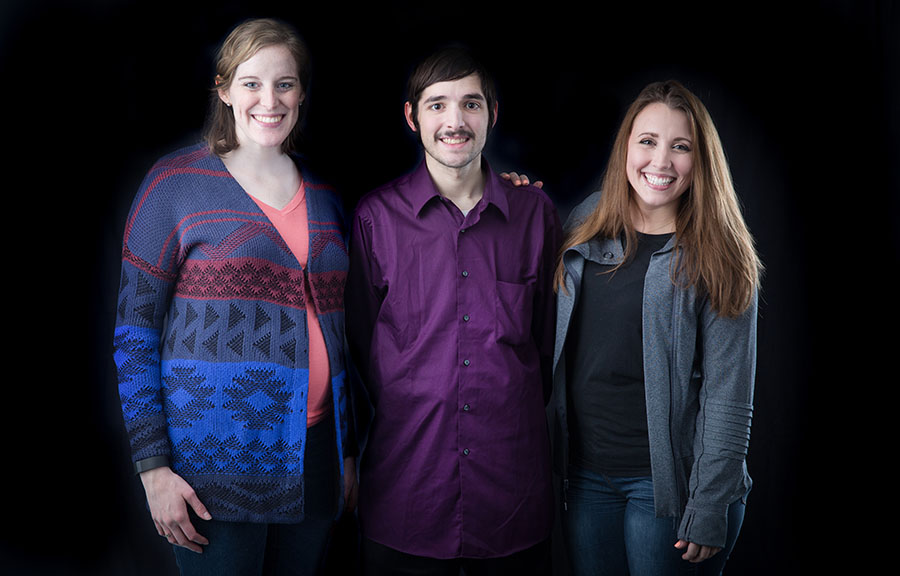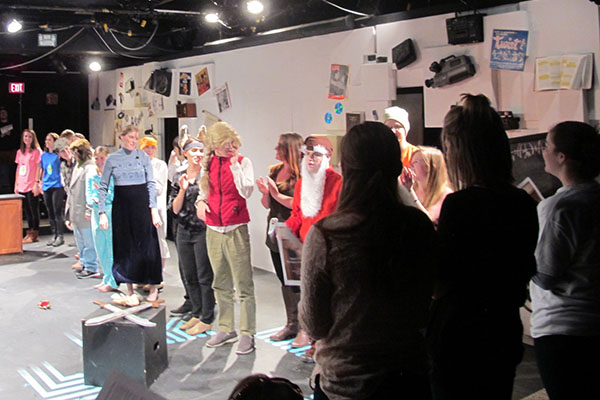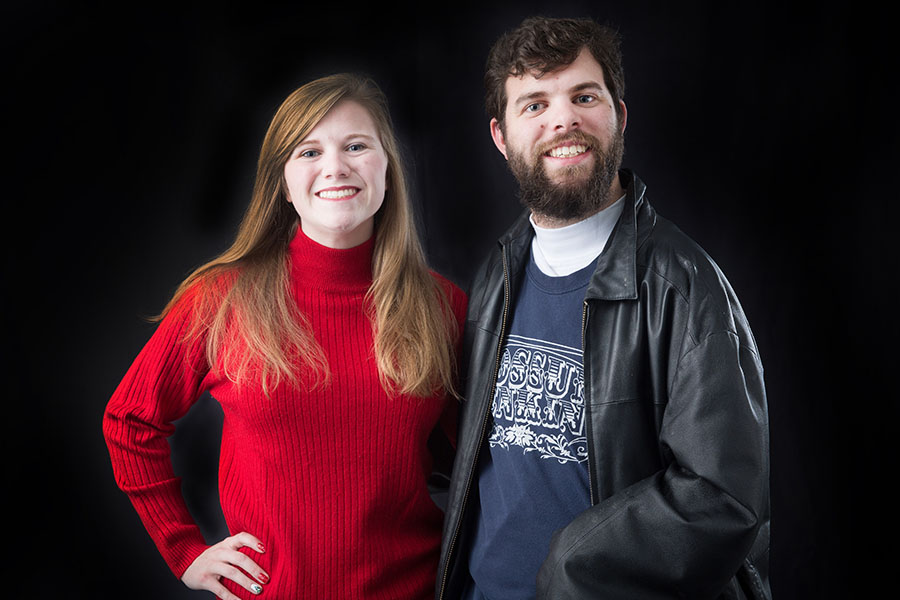Pilot study shows promise in improving speech/language skills for young people with autism and intellectual disabilities
Senior Amanda Ufer of Mechanicsville, Virginia, jumped at the chance to participate in Appalachian State University’s exploratory pilot study called Theatre and Therapy Project when her professor approached her about the opportunity. A theater arts/theatre education major with “a heart for teaching,” Ufer said the experience to work with adolescents and young adults with autism and intellectual disabilities will help her “100 percent” in her career.
“I didn’t grow up with a sibling, or a best friend with a sibling, who required an adapted curriculum, so I felt unprepared” to work with this population, she said. She wanted to learn, since the likelihood of having such students in her future classroom is high, she added.
Likewise, Chelsea Alexander, an Appalachian junior with plans to attend graduate school in speech-language pathology, wanted experience in an undergraduate research project. A communication disorders and sciences major, she had already been working in the field as a certified behavioral health professional. This study has given her more experience working with adolescents with special needs.
Ufer and Alexander, who is from Warren, Maine, are two of 15 students who benefitted from this exploratory pilot research project at Appalachian. Designed to use activity-based intervention and video modeling to help local young people improve their speech, language and social skills, the project also helped Appalachian students prepare to be better educators and clinicians.
‘A completely collaborative process’
In the 20-week project, the Appalachian students worked in a triad – one theatre education major and one communication disorders major paired with a participant with special needs.
“We worked together. The theatre major was giving input on theatre and acting, the communication student was giving input on the articulation/phonological side of the delivery,” said Alexander.
As a team, the triad worked on reaching particular goals related to speech, language and social skills by the participants and their families. “We took the goals they weren’t meeting in other settings and worked on them through theatre,” Ufer explained. “It was a completely collaborative process.” Establishing and meeting clients’ goals, often as part of an interdisciplinary team, is exactly what communication disorders professionals will do in their careers, Alexander said.
Emily Runyon of Hartwell, Georgia, worked in the triad with Alexander as a graduate student clinician in communication sciences and disorders. It was her task to make sure the goals for their participant were being met. “It’s not just ‘Let’s sit in a room and let me teach you something.’ We were working together,” said Runyon, who earned her undergraduate degree in the same discipline from Appalachian in 2015.
The Appalachian students began training and working together in spring 2016 in preparation for the project, and then began working with the participants over the summer and into the fall semester.
“We had targets we had to meet every week while we also had the fun goal of putting a whole performance together,” Ufer said. The project culminated in a theatre performance inside Appalachian’s I.G. Greer Studio Theatre in November called “Stages of Success: The Power of Performance.”
Each weekly rehearsal would begin with warm-up exercises that might focus on simply getting to know one another better and later vocalization, improvisation or other skills. “We’d give them an exercise, like pretending to be at a bus stop having a spur-of-the-moment conversation: ‘You’re a baseball player and you’re a mom – have a conversation!’ All things that were entertaining and fun to do, but we’d work in their goals, such as making eye contact while talking,” Ufer said.
Students learned to be flexible with the participants and their needs. The outcomes were rewarding.
“Some of our most shy participants by the end were making their own warm-up exercises and leading them in the group, just volunteering. Things you’d not expect,” Alexander said.
Watch segments of “Stages of Success: The Power of Performance,” presented by participants in a research study on the use of theatre as therapy for 15- to 25-year-olds with moderate to severe communication impairments.
What a research project can teach
“As a theatre education major, it was such a blessing for me to be able to truly see students who required an adapted curriculum and how they work, how they work with one another and how they respond to direction… I had the pedagogy on paper and this project let me apply it,” said Ufer.
Ufer said she got practice in how to teach theatre at basic levels, which will serve her well as an educator. “When I say ‘Let’s block this scene,’ I have to be able to explain what blocking is for my students,” she said.
For Alexander, she benefited from the triad approach and the equilateral relationship it fostered, in comparison to giving commands with a client using flash cards. “I didn’t know anything about theatre and I’m having to learn theatre. It’s completely leveled when we’re teaching each other things toward the same goal,” she said of the client/practitioner relationship.
Alexander also valued the study’s approach to embedded therapy in a fun activity, leading to “incredible strides in a short period of time.” She likened it to equine therapy for physical impairments. “Clients are sitting on a horse because they love horseback riding and they don’t know they’re doing physical therapy,” she explained.
For Runyon, the pilot study offered “an irreplaceable experience” of learning “how important it is to be flexible with people with autism and also to focus on skills that can help them navigate who they are, not change who they are,” she said. “They should have confidence.”
A community is formed
“I loved the community that developed… so many smiles,” Ufer said. “It wasn’t just a learning experience as much as it was a social aspect for all of us – we learned more about each other and different perspectives.”
Theatre therapy should become an established intervention because, Alexander said, “it works and they have fun. That’s one of the greatest take-aways: It’s not just on paper that we see they can better pronounce their ‘r’s’ or their volume is improved, they had fun and made friends. It’s hard to do both those things in therapy.”
Pilot study shows promise in improving speech/language skills for young people with autism and intellectual disabilities
About the Department of Theatre and Dance
The Department of Theatre and Dance is one of seven departments housed in Appalachian’s College of Fine and Applied Arts. Its mission is to facilitate transformative experiences for students and the public, which cultivate compassionate, creative and collaborative communities through theatre and dance. The department also offers coursework for integrated learning through the arts to the general university student population. Its dynamic co-curricular production program provides exemplary theatre and dance experiences to departmental students, the university community and the region. Learn more at https://theatreanddance.appstate.edu.
About the Beaver College of Health Sciences
Appalachian State University’s Beaver College of Health Sciences (BCHS), opened in 2010, is transforming the health and quality of life for the communities it serves through interprofessional collaboration and innovation in teaching, scholarship, service and clinical outreach. The college enrolls more than 3,600 students and offers 10 undergraduate degree programs, nine graduate degree programs and four certificates across seven departments: Kinesiology, Nursing, Nutrition and Health Care Management, Public Health, Recreation Management and Physical Education, Rehabilitation Sciences, and Social Work. The college’s academic programs are located in the Holmes Convocation Center on App State’s main campus and the Levine Hall of Health Sciences, a state-of-the-art, 203,000-square-foot facility that is the cornerstone of Boone’s Wellness District. In addition, the college supports the Appalachian Institute for Health and Wellness and has collaborative partnerships with the Wake Forest University School of Medicine’s Physician Assistant Program, UNC Health Appalachian and numerous other health agencies. Learn more at https://healthsciences.appstate.edu.
About the College of Fine and Applied Arts
Appalachian State University’s College of Fine and Applied Arts is a dynamic and innovative group of seven academic departments, bringing together a variety of perspectives, experiences and real-world education to provide unique opportunities for student success. The college has more than 3,500 undergraduate and graduate majors. Its departments are Applied Design, Art, Communication, Military Science and Leadership, Sustainable Development, Sustainable Technology and the Built Environment, and Theatre and Dance. Learn more at https://cfaa.appstate.edu.
About Appalachian State University
As a premier public institution, Appalachian State University prepares students to lead purposeful lives. App State is one of 17 campuses in the University of North Carolina System, with a national reputation for innovative teaching and opening access to a high-quality, cost-effective education. The university enrolls more than 21,000 students, has a low student-to-faculty ratio and offers more than 150 undergraduate and 80 graduate majors at its Boone and Hickory campuses and through App State Online. Learn more at https://www.appstate.edu.
What do you think?
Share your feedback on this story.





![How NCInnovation Is Rethinking Economic Development in North Carolina [faculty featured]](/_images/_posts/2026/02/rethinking-economic-development-600x400.jpg)








